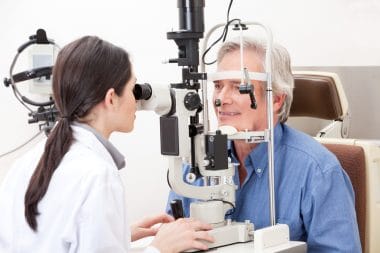Glaucoma surgery is preformed to fix drainage problems due to high intraocular pressure. In the eye, the anterior chamber’s watery fluid, called aqueous humor, flows through the iris and the cornea to keep ocular pressure levels at a normal level. However, when the aqueous humor drains too slowly or is produced too quickly, the fluid builds up, increasing intraocular pressure. As a result, the ocular nerve fibers become damage and may die, which could cause permanent vision loss. Laser or non-laser procedures are available to alleviate glaucoma symptoms. It takes anywhere from ten to sixty minutes, and there are many procedure options available. Glaucoma procedures may relieve further vision loss, but are unable to restore vision that has already been lost. A laser trabeculoplasty will increase fluid drainage in the eye. During this procedure, the doctor uses a special contact lens to focus lasers on specific areas on the eye. If successful, ocular pressure will be alleviated. A peripheral iridotomy is another type of laser procedure that opens a narrow or closed drainage area, which would allow fluid to drain properly. Lasers would be used to create a small hole in the iris, causing fluid to flow properly. Cyclophotocoagulation is an additional type of laser procedure that uses a laser to destroy parts of the ciliary body, which produces aqueous humor. This should reduce the production of fluid, thereby decreasing eye pressure. A non-laser option is a trabeculectomy. A small incision is made to remove tiny pieces of tissue in the eye, which would allow fluid to drain out properly.
Key Points of Video:
- 1Glucoma happens when the fluid (occular fluid?) in the eye has problem passing through to the cornea and putting pressure in the eyes and will damage the vision. Over time, it will put pressure on the nerve and will cause vision damage.
- 2There are two types of surgeries for glaucoma. One is laser surgery, the other is non-laser surgery.
- 3Vision that is lost due to Glaucoma cannot be restored. Swimming or showering are to be avoided after surgery. Doctor may give general anesthesia during the surgery.










Reply